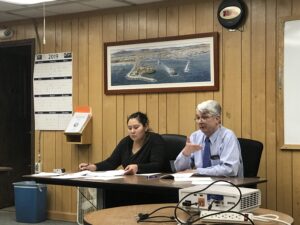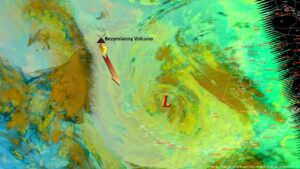Norton Sound Health Corporation shut down some of its COVID-19 testing sites in Nome in early April. Nome residents can still get tested at the Cough and Cold Clinic in Norton Sound Regional Hospital, but NSHC no longer provides testing at Nome Airport or the NSHC Operations Center. Residents of other communities in the Norton Sound and Bering Strait region can still contact their local clinics to get tested.
NSHC shut those testing sites down to make more efficient use of staff time, according to NSHC Public Relations Manager Reba Lean. But along with relaxed travel restrictions and masking requirements, the testing site shutdown signals a shift in the way public health authorities are managing the pandemic.
COVID-19 has entered its endemic phase in the Norton Sound and Bering Strait region, NSHC Medical Director Dr. Mark Peterson said. That’s where the virus exists at a fairly consistent level within a population as a part of everyday life. One clear example of an endemic virus is influenza.
“Every year, we get flu cases. So the same is going to happen, likely, for COVID, where there’ll be probably a season for COVID. It might be similar to the season for flu, but we’re going to have that. It’s going to be here, I don’t think it’s going away,” Peterson said.
One of the biggest reasons for the shift to an endemic control phase is that the omicron variant, currently the most common variant of the virus, is unlikely to cause severe illness.
“With a pandemic, you have severe illness and death. That has to be part of a pandemic, you’ve got to have a spread of virus that causes significant illness. Well, we’re not seeing that now. There’s still plenty of spread of virus and there’s some increase in virus in certain parts of the country. But there’s not been a bump in hospitalizations and deaths,” Peterson said.
Another significant element is the relatively high percentage of people in the Norton Sound and Bering Strait region who are vaccinated. According to Reba Lean, over 75% of the regional population has received at least their first series of vaccinations — the initial two shots, or just one shot in the case of the Johnson & Johnson vaccine. By comparison, only 66% of the total U.S. population has received their first series. Vaccinations will be an important part of managing COVID-19 going forward.
“You just don’t know what’s going to happen down the road, whether we may get other variants, so get vaccinated, get boosted,” Peterson said.
NSHC is still performing extensive contact tracing for confirmed cases of COVID-19, Peterson said, and he encouraged anyone who is showing symptoms, or who is a close contact of someone with COVID-19, to get tested.
So, is the Norton Sound and Bering Strait region finally through the worst of the pandemic? Most likely it is, Peterson said.
“I can say with pretty good comfort: yeah, I think we’re past the worst of it. We can’t predict the future; however, past pandemics of other viruses suggest that we’re in a pretty good spot here after a couple of years. So I think we are, for the most part, over this. I think we’re headed to a much better summer, and a much better 2022 and 2023. Time will tell, but I think we can feel pretty comfortable about things,” he said.
NSHC will continue to publish updates on new cases every weekday, and the tribal health call now takes place once a week, at 11 a.m. every Wednesday morning.
Image at top: The COVID-19 Virus. Photo credit: Centers for Disease Control and Prevention.





